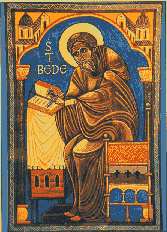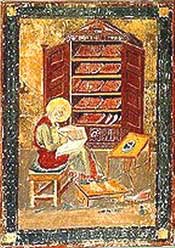Readings:
Ecclesiastes 12:9-14
Psalm 139:10-17
1 Corinthians 15:1-8
Matthew
13:31-33
Preface of a Saint (1)
[Common of a Monastic or Professed Religious]
[Common of a Theologian and Teacher]
[Of the Holy Trinity]
[Of the Reign of Christ]
Almighty God, who hast enriched thy Church with the learning and holiness of thy servant Bede: Grant us to find in Scripture and disciplined prayer the image of thy Son our Savior Jesus Christ, and to fashion our lives according to his likeness, to the glory of thy great Name and the benefit of thy holy church; through the same Jesus Christ our Lord. Amen.
PRAYER (contemporary wording)
Almighty God, who has enriched your Church with the learning and holiness of your servant Bede: Grant us to find in Scripture and disciplined prayer the image of your Son our Savior Jesus Christ, and to fashion our lives according to his likeness, to the glory of your great Name and the benefit of your holy church; through the same Jesus Christ our Lord. Amen.
Lessons revised in Lesser Feasts & Fasts 2024.
Return to Lectionary Home Page
Webmaster: Charles Wohlers
Last updated: 29 March 2025
BEDE THE VENERABLE
PRIEST, MONK, SCHOLAR (25 MAY 735)
 Bede
was a monk at the English monastery of Wearmouth and Jarrow, in Northumbria.
From the age of seven, he spent all his life at that monastery except
for a few brief visits to nearby sites. He says of himself: "I have devoted
my energies to a study of the Scriptures, observing monastic discipline,
and singing the daily services in church; study, teaching, and writing
have always been my delight."
Bede
was a monk at the English monastery of Wearmouth and Jarrow, in Northumbria.
From the age of seven, he spent all his life at that monastery except
for a few brief visits to nearby sites. He says of himself: "I have devoted
my energies to a study of the Scriptures, observing monastic discipline,
and singing the daily services in church; study, teaching, and writing
have always been my delight."
He was the first person to write scholarly works in the English language, although unfortunately only fragments of his English writings have survived. He translated the Gospel of John into Old English, completing the work on the very day of his death. He also wrote extensively in Latin. He wrote commentaries on the Pentateuch and other portions of Holy Scripture. His best-known work is his History of the English Church and People, a classic which has frequently been translated and is available in Penguin Paperbacks. It gives a history of Britain up to 729, speaking of the Celtic peoples who were converted to Christianity during the first three centuries of the Christian era, and the invasion of the Anglo-Saxon pagans in the fifth and sixth centuries, and their subsequent conversion by Celtic missionaries from the north and west, and Roman missionaries from the south and east. His work is our chief source for the history of the British Isles during this period. Fortunately, Bede was careful to sort fact from hearsay, and to tell us the sources of his information. He also wrote hymns and other verse, the first martyrology with historical notes, letters and homilies, works on grammar, on chronology and astronomy -- he was aware that the earth is a sphere, and he is the first historian to date events ANNO DOMINI, and the earliest known writer to state that the solar year is not exactly 365 and a quarter days long, so that the Julian calendar (one leap year every four years) requires some adjusting if the months are not to get out of step with the seasons.
His hymns include one for the Ascension, which follows.
 A hymn of glory let us sing;
A hymn of glory let us sing;
New songs throughout the world shall ring:
Christ, by a road before untrod,
Now rises to the throne of God.
The holy apostolic band
Upon the Mount of Olives stand;
And with his followers they see
Their Lord's ascending majesty.
To them the angels drawing nigh,
"Why stand and gaze upon the sky?
This is the Savior," thus they say;
"This is his glorious triumph day.
"Again shall ye behold him so
As ye today have seen him go,
In glorious pomp ascending high,
Up to the portals of the sky."
O risen Christ, ascended Lord,
All praise to thee let earth accord,
Who art, while endless ages run,
With Father and with Spirit one.
Suggested tune is Agincourt, also called Deo Gratias (or Gracias), found in some hymnals and heard at the end of the Olivier film version of Henry V. (Capital letters represent notes an octave lower than lower-case letters; t = b-flat.)
d d c | d - c | c B - | A - d | d c A | G A D | F E - | D - A | c - c | d c T | A G - | F - F | A - A | G - F | F E - | D -
by James Kiefer